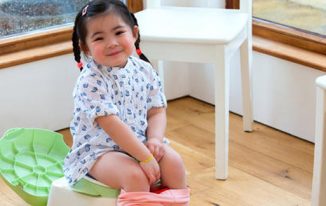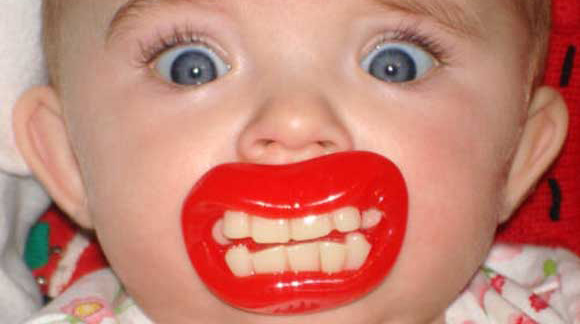
For some moms, pacifiers are heaven-sent. They’re very convenient to take along and the babies love them so much. Such is the reason why moms have come up with so many pet names for the simple pacifier.
The most commonly used names are: soother, dummy, paci, and binky, among others.
In fact, BabyCenter.com has actually listed 172 other names for the simple pacifier — all of which have been coined by the creative minds of parents and their babies.
Even if there are a lot moms who seem to think it’s okay for their babies to use a pacifier, you’re probably still in a quandary. After all, there are those who think that pacifier use may be harmful. For example, according to huffingtonpost.ca:
… some moms and dads fall squarely in the no-soother camp — worried their child could become dependent, harm their teeth or delay speech development.
Most pediatricians and researchers say it’s okay to use pacifiers during the early months of a baby. However, they also suggest and are in agreement with the American Academy of Pediatrics’s recommendation that pacifiers should NOT be overused and that babies should be weaned from pacifiers before their first birthday.
Here’s a great tip from North Shore Pediatric Therapy with regards to how long should a baby use a pacifier:
Depending on the specific needs of your child, wean him or her from the pacifier after 6 months (when risk of SIDS drops) and before 18 months (when speech and language development is occurring rapidly).
With that, here are the 7 good reasons as to why it’s okay use pacifiers during the early months of your baby:
7. Pacifiers may reduce the risk of SIDS. Several studies have found a decrease in the risk of sudden infant death syndrome(SIDS) in infants who use a pacifier. “The periodic movement of your baby’s mouth while sucking keeps him in a lighter state of sleep, so there is less of a chance that he will stop breathing,” says Jennifer Shu, M.D., a Parents advisor and coauthor of Heading Home With Your Newborn. “Plus, having a paci in your baby’s mouth helps to keep his airway open,” she adds, which could also help decrease his risk of SIDS. Source: Parents.com
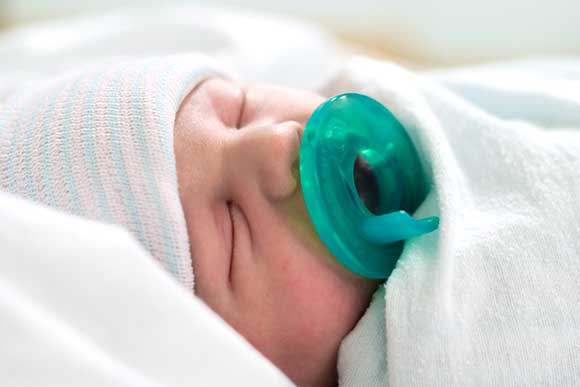
This is probably the best reason as to why you should grab that pacifier.
SIDS is every parent’s nightmare. Imagine the sudden death of a little one not older than one year old. That’s truly heartbreaking, to say the least.
This is what livescience.com has to say about SIDS:
It is the leading cause of death of children ages 1 to 12 months, according to the Centers for Disease Control and Prevention. In 2010, more than 2,000 U.S. infants died from SIDS. The National Institutes of Health reports that SIDS is most likely to occur when the baby is between 2 and 4 months old. The incidence increases in cold weather. Infants who die of SIDS show no signs of suffering.
SIDS is scary. However, the good old pacifier can help lessen the occurrence of SIDS. According to babble.com:
Several studies have shown a two- to threefold decrease of SIDS deaths among babies who use a pacifier. As explained in a recent article in Pediatrics magazine, “The hypothesis is that a pacifier protects the upper airway from becoming obstructed by the tongue.”
So if a pacifier can lessen the chances of sudden stoppage of breathing in babies, then it’s definitely worth grabbing one now, right?
The next good reason as to why it’s okay for your baby to use a pacifier sets the record straight on nipple confusion.
Did you actually believe that a pacifier could interfere with breastfeeding? Well, this next good reason is not just surprising it’s also backed up by science.
6. Pacifiers increase the chances of breastfeeding. Limiting pacifier use resulted in decreased rates of exclusive breast-feeding. After tracking 2,249 babies born between June 2010 and August 2011, they noted that exclusive breast-feeding dropped from 79% of infants between July and November 2010 to 68% between January to August 2011. Source: HealthLand.Time.com
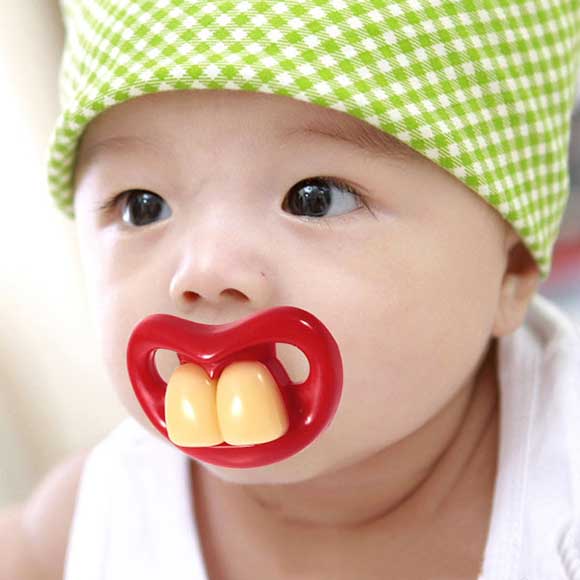
You had probably been warned about pacifiers, especially after making the decision to breastfeed. After all, there’s just so much talk about nipple confusion that’s associated with a pacifier.
According to the nursing experts on this breastfeedingbasics.com:
The risk of nipple confusion, whether by introducing a bottle or pacifier, is greatest during the early days of nursing. The longer you wait to introduce artificial nipples, the less risk there is of confusing your baby.
Here’s the good news; there is no nipple confusion after all. Hence, the pacifier will not intervene with your baby’s breastfeeding.
This is scientifically backed up. Today.com cites:
In December 2010, Oregon Health & Science University Doernbecher Children’s Hospital locked up pacifiers in the newborn nursery to improve their breast-feeding record even more. To everyone’s surprise, they saw breast-feeding rates drop as soon as the pacifiers were no longer readily available.
Do you want to know why it’s quite natural for babies to use a pacifier?
If there’s one thing that newborns do a lot of, it’s to suck.
5. Satisfy the suck reflex. Babies have a natural need to suck. The bottle or breast usually meets this need, but the desire can linger even after the belly is full. A pacifier can help. Just be sure it doesn’t replace mealtime. Source: WedMD.com
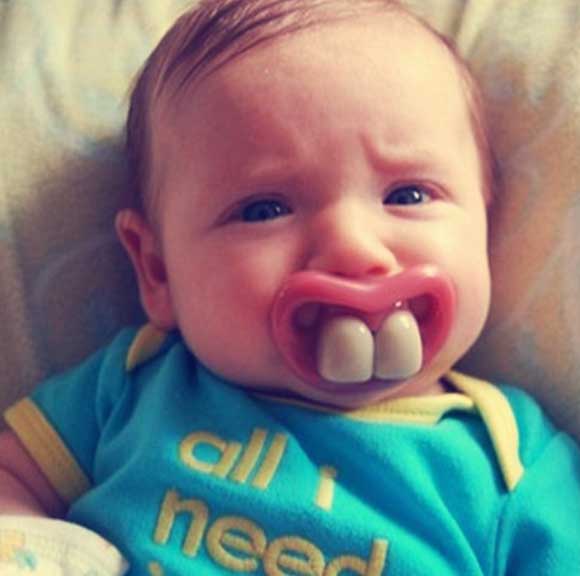
Sucking on something is such a natural tendency for newborns. It’s so natural that they have been doing it since they were inside the womb. As a matter of fact, a study confirms that:
Sucking a thumb in the womb is a sign of a healthy baby to come.
There are times when sucking is misconstrued as hunger. This is because the baby cries when the feeding stops. As a parent, you need to decipher as to why your baby is crying. You just can’t surmise that your baby is hungry.
Keeping in mind that babies have a natural tendency to suck, it makes it a lot easier for you to grab a pacifier. With a pacifier, you have another option as to how to calm your baby down. You’re not just going to end up feeding your baby to satisfy the need to suck.
Here’s something to think about. According to this babycentre.co.uk:
For some babies, the need to suck is very strong. If you’re breastfeeding, you could let your baby suckle your breast for comfort. Alternatively, let her suck on your clean finger or knuckle. Most babies will never need a dummy, but this is another option to try if you think it may help her.
If you think a pacifier is a hard habit to break, think again. Between your baby’s thumb and a pacifier, the latter is a better option.
This is the reason why the pacifier is a better option.
4. The pacifier is in your control. That can be a good thing when nothing but plunking that pacifier in your baby’s mouth will gate calm. Plus, unlike the thumb (which is in baby’s control) you decide when it’s time for your baby to give up the binky, and you’re the one who pulls the plug (whether your baby will put up a fight is another issue). In fact, research has shown that finger-sucking can be a harder habit to break. Source: WhatToExpect.com
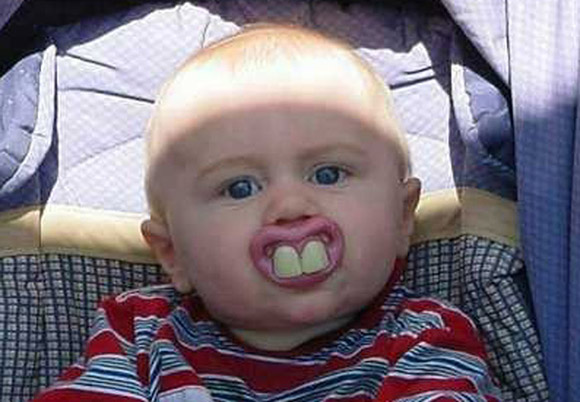
Knowing that babies have a natural tendency to suck, getting them to suck on a pacifier will spare them from sucking their thumbs. Needless to say, this lessens the chances of thumb sucking.
Although it is also natural for babies to suck their thumbs, it has to stop at a certain age. According to startribune.com:
The urge to suck one’s thumb or finger is a survival skill that starts at birth. But at about age 5, when permanent teeth start coming in, it’s time to put an end to the habit, dentists say.
For some kids, it can be a lot harder to stop the habit of thumb sucking. Startribune.com has this to add:
Nearly one-third to half of all preschoolers suck their thumbs. The number falls to about 6 percent of 7- to 11-year-olds. But those who don’t or can’t quit find that thumb sucking can become embarrassing, disfiguring and expensive.
This is the reason why more and more moms prefer to the pacifier over the thumb. According to popsugar.com:
Many moms suggested that the pacifier is an easier habit to break than thumb-sucking, and the AAPD agrees. After all, you can put a pacifier out of reach, but you can’t exactly remove your baby’s thumb!
The pacifier is considered heaven-sent for sleep-deprived parents.
Do you want to enjoy a brief moment of silence? Reach out for a pacifier.
3. Pacifiers can be soothing for babies. If your baby is cranky or fussy, a pacifier may help him or her calm down. It may also relax your baby to help him or her fall asleep. Pacifiers may also help soothe your baby during common medical procedures, such as when he or she gets an immunization (also called a shot) or a blood test. Source: FamilyDoctor.org
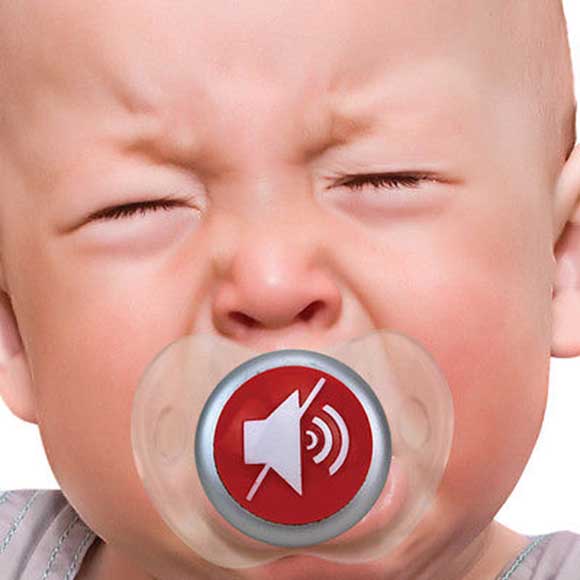
Wouldn’t you just love that? With your baby asleep, you can also get the much-needed rest your body is clamoring for.
Don’t worry. It’s a common practice for parents to rely on a pacifier. According to babycenter.ca there may even be an increase in the use of pacifiers.
It’s very common and may be on the increase. A large 1999 study reported that two thirds of mothers used a soother at some point.
Here’s something to think about. While a pacifier can help your baby fall asleep, it’s not exactly an ideal sleeping aid. This experts at ParentingScience.com points this out very well.
When the pacifier falls out of the baby’s mouth, the soothing effect ends. And the pacifier will fall out of the baby’s mouth. In a study that recorded the sleep patterns of babies aged 6-18 weeks, almost two-thirds of infants lost their pacifiers within 30 minutes of falling asleep (Franco et al 2004).
The soothing effect of a pacifier is temporary. Nothing can beat your loving touch to put the little one to sleep. Now if you are desperate to get some sleep as well, go grab that pacifier.
The next reason as to why it’s okay for your baby to use a pacifier might just surprise you.
Yes, the pacifier can actually do this for your baby …
2. Pacifier can help your baby gain more weight. Preemies who suck on binkies gain weight faster, according to a 1992 study published in the Swedish journal Acta Pediatrica. Other research has found that preemies who use pacifiers shortly after birth show earlier sucking patterns and experience fewer health complications. “Sucking promotes oral-muscle function and muscle development,” says Nina L. Shapiro, M.D., assistant professor of pediatric otolaryngology at the University of California, Los Angeles, School of Medicine. Source: FitPregnancy.com
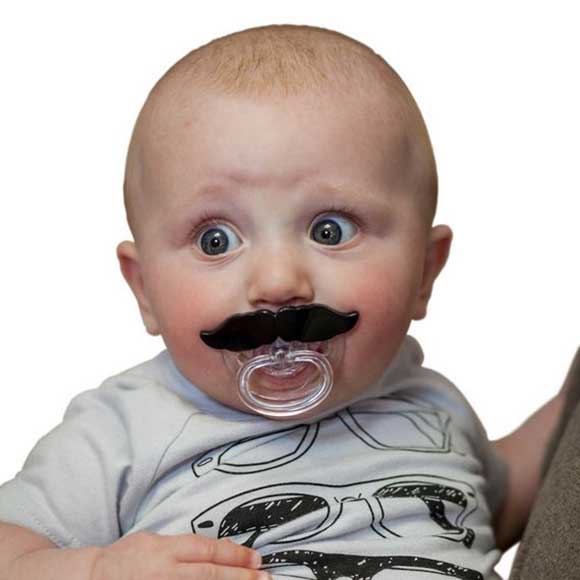
Pacifiers don’t have any kind of nutritional content; that’s for sure. However, the actual process of sucking a pacifier seems to boost the oral-muscle development of your baby.
So what’s that got to do with weight gain? Grey.colorado.edu explains it pretty well.
Newborns are born to suck. When a baby sucks, they strengthen their oral motor muscles, explore different sensations in their mouth and learn about tastes.
Furthermore, the pacifier can also ease the pain of teething. According to parents.com, a pacifier can help massage your baby’s gums. This makes the teething stage a bit more comfortable for your baby.
So if your baby is not experiencing any kind of discomfort in the oral area, feeding wouldn’t be such a struggle. With that, your baby has more chances of gaining weight.
Remember this. Feeding and sucking on a pacifier are two different things. You can never replace one with the other.
There is one more good reason as to why it’s okay to allow your baby to use a pacifier. Did you know that …
1. A pacifier can help premature babies. A dummy may help if your baby is premature. If he’s given a dummy to suck on before feeds, he may adapt more quickly from tube-feeding to bottle-feeding. He may also be calmer and settle more easily before and after his feeds. Premature babies who are given a dummy also have shorter hospital stays. Source: BabyCentre.co.uk
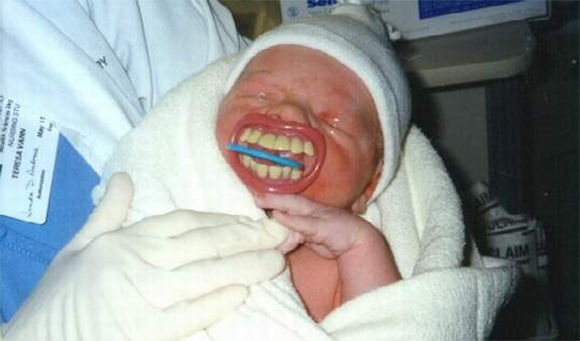
Do you find that hard to believe? If you do, then take a look at what medicaldaily.com has to say about it.
Whenever a premature baby is born, they are given a pacifier, among other things, to assist with therapy — many of them can’t feed correctly because of a lack of sucking power.
If you decide to allow your child to use a pacifier, here are some great additional guidelines that were provided by North Shore Pediatric Therapy.
Try to limit your baby’s pacifier use to nap-time or sleep only.
Instead of offering your child his or her pacifier during moments of boredom or increased emotion, find new ways to assist in self-directed entertainment or self-soothing; for example, redirect your child to a fun activity, play music, read a book, or offer a preferred toy.
Restrict use if your child has a history of recurrent otitis media (middle ear infections)
Use an appropriately sized pacifier. (Pacifiers are sized based on your baby’s age.)
Do not allow children to share pacifiers.
Wash pacifiers in soap and water to keep them clean between uses.
Use a pacifier with ventilation holes to let air in.
Do not sweeten a pacifier, as it can damage your baby’s teeth.
At the end of the day, the decision to allow your baby to use a pacifier is all yours. Should you decide to grab a pacifier for your baby, you have all these good reasons to back you up.
Do you allow your baby to use a pacifier?







